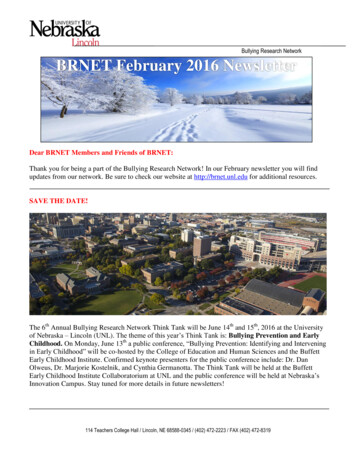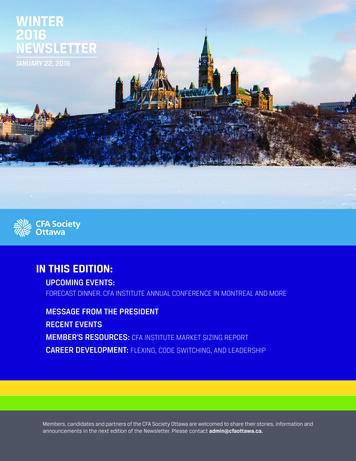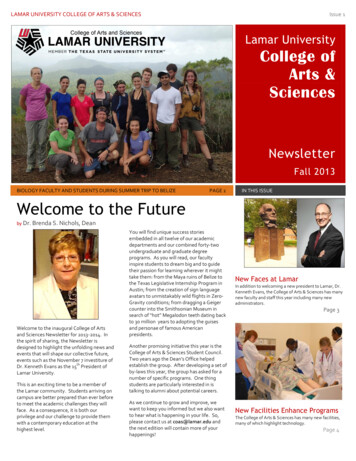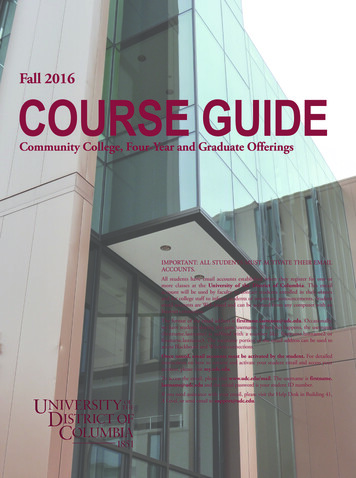
Transcription
Bullying Research NetworkBRNET February 2016 NewsletterDear BRNET Members and Friends of BRNET:Thank you for being a part of the Bullying Research Network! In our February newsletter you will findupdates from our network. Be sure to check our website at http://brnet.unl.edu for additional resources.SAVE THE DATE!The 6th Annual Bullying Research Network Think Tank will be June 14th and 15th, 2016 at the Universityof Nebraska – Lincoln (UNL). The theme of this year’s Think Tank is: Bullying Prevention and EarlyChildhood. On Monday, June 13th a public conference, “Bullying Prevention: Identifying and Interveningin Early Childhood” will be co-hosted by the College of Education and Human Sciences and the BuffettEarly Childhood Institute. Confirmed keynote presenters for the public conference include: Dr. DanOlweus, Dr. Marjorie Kostelnik, and Cynthia Germanotta. The Think Tank will be held at the BuffettEarly Childhood Institute Collaboratorium at UNL and the public conference will be held at Nebraska’sInnovation Campus. Stay tuned for more details in future newsletters!114 Teachers College Hall / Lincoln, NE 68588-0345 / (402) 472-2223 / FAX (402) 472-8319
Researcher Spotlight – Dr. Justin PatchinJustin W. Patchin, Ph.D., is a professor of Criminal Justice at the University of Wisconsin-Eau Claire(www.justinpatchin.com/). He received his Ph.D. in Criminal Justice from Michigan State University.Since 2002 he has been exploring the intersection of teens and technology, with particular focus oncyberbullying, social networking, and sexting. He has travelled around the United States and abroadtraining educators, counselors, law enforcement officers, parents, and youth on how to prevent the misuseof technology.Dr. Patchin is co-director (with long-time collaborator Sameer Hinduja) of the Cyberbullying ResearchCenter (www.cyberbullying.org) and has written seven books and numerous academic and professionalarticles on adolescent behaviors online. His first co-authored book: “Bullying beyond the Schoolyard:Preventing and Responding to Cyberbullying” was named Education Book of the Year in 2009 byForeWord Reviews. An updated edition of that book was published in October of 2014. His co-authoredbook: “Words Wound: Delete Cyberbullying and Make Kindness Go Viral,” published in December of2013, was written to help teens navigate, and be the solution to, various online problems. A freecompanion Leader’s Guide to Words Wound is also available for r/.Dr. Patchin has presented to thousands of adults and teens at conferences and schools around the world, aswell as at the White House and the FBI Academy. He has appeared on the BBC, CNN, NPR, and in theNew York Times and other national and international media to discuss the issues associated with teensuse and misuse of technology.Along with Dr. Hinduja, Dr. Patchin is principal investigator of a 188,000 Digital Trust Foundation grantto collect nationally-representative data from middle and high school students on their experiences withcyberbullying and electronic dating violence. Their latest book “Bullying Today: Bullet Points and BestPractices” will be published in May, 2016.In his free time, Dr. Patchin enjoys running and spending time in the outdoors with his wife and son, andtheir two German shorthaired pointers. He’s recently taken up photography, with a “focus” on wildlifeand landscapes (http://www.viewbug.com/member/JustinPatchin). He especially enjoys capturing theAurora Borealis.Annotated Reading List on Authority and Marginalization of Youth in Schools and EducationIn October 2015, following a violent incident against a young female student at Spring Valley HighSchool in Columbia, South Carolina, Prudence Carter, Jacks Family Professor of Education and FacultyDirector of the John W. Gardner Center for Youth and Their Communities at Stanford University, put outa call to educational researchers and other social scientists “to make informative research more widelyknown to educators, parents, students, activists, community-based organizations and many others, as theycontinue to eradicate disparate treatment in discipline, suspensions, and expulsions in schools.” We arepleased to release the resulting collective effort of many around the nation--an annotated reading list onauthority and the marginalization of youth in schools and education--and encourage you to share itbroadly.Here's the link to the #EdResearch4SpringValley Bibliography: https://goo.gl/dEvg4B2
BRNET New Members!BRNET has a current total of 163 members! Please send recommendations for potential BRNET members (i.e., faculty, researchers, andclinicians who are conducting research on bullying or related topics) to Dr. Shelley Hymel, Dr.Susan Swearer, or to bullyresearchnet@gmail.com.If you have recently joined BRNET and have not yet provided your information, please send the followingto bullyresearchnet@gmail.com.1)2)3)4)contact information that can be posted on the website,a brief biography of you and your work,a list of current/ongoing projects in this area,an annotated bibliography of your work in this area (i.e., full reference plus a few sentences about thework), and,5) relevant web-based links you would like to share.Friends of BRNETFriends of BRNET is a group of graduate students, administrators, parents, and individuals who areinterested in learning more about the Bullying Research Network. Friends of BRNET receive our monthlye-newsletter. If you are interested in becoming a Friend of BRNET or to refer someone to Friends ofBRNET, please click on this link: http://cehs15.unl.edu/cms/index.php?s 2&p 711BRNET Member Grant/Funding AnnouncementsReceipt of funding facilitates the BRNET mission to conduct interdisciplinary research related to bullyingand aggression, with particular attention being paid to the link between basic and applied research. Thus,the BRNET directors are excited to offer members a new opportunity to share grants (and other sources offunding) they have received for their research projects.Funding varies across countries and is not limited to federal grants. If you are interested in sharing yourgrants or funding with other BRNET members, please send an abstract of the research funding along withthe funding source to bullyresearchnet@gmail.com and we will post the information on our website.BRNET MEMBER ANNOUNCEMENTS(1) Congratulations, Dr. Dorothy Espelage!Congratulations to Dorothy Espelage, who was named a Fellow of APS and the recipient of the APAAward for Distinguished Contributions to Research in Public Policy. These are wonderfulaccomplishments!3
(2) Looking for Research Masters StudentsDear colleague,First, we are looking for new Research Master students. See attached the brochure. So, if you havestudents that want to learn about social network analysis, please recommend our program.Second, please find attached two social networks new papers:Rambaran, J.A., Hopmeyer, A., Schwartz, D., Steglich, C., Badaly, D., & Veenstra, R. (2016). Academicfunctioning and peer influences: A short-term longitudinal study of network-behavior dynamics in middleadolescence. Child Development.This study showed that friendships were formed and maintained when adolescents had low levelsof achievement or high levels of truancy. Particularly, it was found that individuals who had highlevels of truancy were relatively more negatively assessed by peers through receiving fewerfriendship nominations from peers who had low levels of truancy. Considering that truantadolescents extended more friendship nominations to these peers themselves, this can be seen as aform of peer rejection, which puts them in a disadvantaged and potentially isolating socialposition. Similarity in academic functioning was also explained by peer influence. It was foundthat adolescents influenced one another to increase rather than decrease achievement as well astruancy. Moreover, it was found that individuals that occupied central positions in the networkexerted more influence in mutual friendships than other peers. If norm-breaking behavior relatedto poor academic functioning such as truancy is valued by popular youth, other individuals may bemore motivated to conform to these behaviors and attitudes to enter or remain part of the populargroup.Van Rijsewijk, L.G.M., Dijkstra, J.K., Pattiselanno, K.L., Steglich, C.E.G. & Veenstra, R. (2016). Whohelps whom? Investigating the development of adolescent prosocial relationships. DevelopmentalPsychology.This study investigates adolescent prosocial relations by examining social networks based on thequestion “Who helps you”. The effects of individual characteristics (academic achievement,symptoms of depressive mood, and peer status) on receiving help and giving help were examined, andthe contribution of (dis)similarity between adolescents to the development of prosocial relations wasinvestigated. Results from longitudinal social network analyses (RSiena) revealed tendencies towardsreciprocation of help and exchange of help within helping groups. Furthermore, boys were less oftenmentioned as helpers, particularly by girls. Depressed adolescents were less often mentioned ashelpers, especially by low-depressed peers. Moreover, lower academic achievers indicated that theyreceived help from their higher achieving peers. Rejected adolescents received help more often, butthey less often helped low-rejected peers. Lastly, low- and high-popular adolescents less often helpedeach other, and also high-popular adolescents less often helped each other. These findings show that(dis)similarity in these characteristics is an important driving factor underlying the emergence anddevelopment of prosocial relations in the peer context, and that prosocial behavior should be definedin terms of benefitting particular others.If you have related manuscripts (in press or submitted), please let us know.Best wishes,René Veenstra, Ashwin Rambaran, Loes Van Rijsewijk, and others4
(3) International Family Violence and Child Victimization Research ConferenceCCRC and FRL Announce:INTERNATIONAL FAMILY VIOLENCE ANDCHILD VICTIMIZATION RESEARCH CONFERENCEJULY 10-12, 2016RECENTLY UPDATED:INVITED SPEAKERS PAGE IS NOW POSTED!We are pleased to announce the invited speakers for our 2016 conference:Dr. Elizabeth Gershoff“Violence against Children is Preventable: Interventions to Reduce Physical Punishment across Family,School, and Medical Contexts”Dr. Lisa Goodman“How do we know whether domestic violence programs work? Lessons from the Domestic ViolenceProgram Evaluation and Research Collaborative”Dr. Kathleen Kendall-Tackett“Family Violence and the Frontiers of Mind-Body Medicine: Psychoneuroimmunology and Health”Dr. Elizabeth Miller“Rethinking Sexual and Dating Violence Prevention: Sex, Gender, and Trauma”Dr. Michele Ybarra“The Role of Technology in Contextualizing Youth Violence”For more information: http://cola.unh.edu/frl/2016-invited-speakersCALL FOR ABSTRACTS! DEADLINE: MARCH 11th, 2016Inviting abstracts on all areas of family violence, research on methodological issues, as well as researchon special populations with a particular emphasis on minority issues in family violence and childvictimization research. For more information visit our website at http://cola.unh.edu/frl/conference.Continuing education will be available for many professional groups. Additional information can beprovided by contacting our conference staff at frl.conference@unh.edu or (603) 862-0767.NEW FOR THIS YEAR OPEN CALL FOR WORKSHOP SUBMISSIONS:We are opening up workshop proposals to all prospective presenters. We will select 3 to 5 workshopproposals for inclusion in the 2016 conference. One conference registration waiver will be granted foreach selected workshop (may be shared among two presenters, each of whom would receive a 50%discount). If you are interested in submitting a workshop proposal, please email the conferenceadministrator at frl.conference@unh.edu.RECENTLY UPDATED:5
RESERVE YOUR ROOM NOW!A room block has been reserved at the Sheraton Harborside Hotel in Portsmouth, NH for conferenceattendees at a rate of 189 per night. To reserve your room at the special conference rate of 189, clickhere n?id 1511164941&key 1B5D514C or call(888) 627-7138. Reservations must be received no later than June 8, 2016. The hotel will continue toaccept reservations after the cut-off date on a space and rate availability basis only. We stronglyencourage you to make your reservation early as rooms fill up quickly. The Sheraton Harborside nolonger accepts reservations directly. Please do not contact the hotel to make reservations.Hope to see you in July!Crimes Against Children Research Center and Family Research LaboratoryUniversity of New Hampshire10 West Edge Drive, Suite 106Durham, NH 03824For more updates follow us on Twitter @IFVCVRConf(4) International Society for Research on Aggression (ISRA)This announcement is to invite you to participate in the XXII biennial meeting of the International Societyfor Research on Aggression (ISRA) in Sydney, Australia, July 19-23, 2016 and to let you know about twoopportunities we offer to young investigators at the meeting.ISRA is a professional society of academic researchers whose members have helped shape our currentunderstanding of conflict and aggression in the broadest contexts. We encourage graduate students,postdoctoral fellows and junior faculty to pursue the study of aggression thru two opportunities at ourmeetings. One is the Lagerspetz Awards, which are given for excellence of presentation. These awardshonor Kirsti Lagerspetz, ISRA co-founder and contributor to aggression research. No applicationnecessary: Submit an abstract, show up and do your best!The second opportunity is the ISRA Young Investigators (YI) Program, We provide a special pre-meetingworkshop for applicants accepted into the program, arrange interactions with senior mentors, and coversome meeting costs. The material below and the PDF attached provides details about the YI Program.More information about ISRA and our meetings is available on our website: israsociety.comI hope to see you in Sydney next July.Michael Potegal, Ph.D., L.P.Chair, 2016 ISRA Young Investigators ProgramISRA President-ElectISRA Young Investigators (YI) Program – 2016The ISRA YI program began in 2008 to encourage and assist young scholars who are getting started orare in the early stages of their aggression research career. Previous YIs have found the program veryenjoyable and helpful. The YI program at our July 2016 meeting in Sydney, Australia will include:6
1) A Pre-meeting YI Workshop. The 2016 Workshop will focus on supportive group discussion to helpYIs plan, write and/or revise grant applications in accord with reviewer criticisms. YIs are encouraged tosubmit their own proposals to be strengthened. Proposal presentation can be anonymous if desired.Discussion can range from specific editing suggestions to general research issues. General questions aboutscientific research and publications on aggression can also be addressed, depending on YI interest.2) Meet with mentors YIs will meet with a different panel of mentors during lunch or dinner each day forinformal discussion. Mentors will include plenary speakers who will be available for follow-up questionsabout their presentationsThank you for your involvement in the Bullying Research Network! If you have any news, information,research, suggestions for new members, or other materials that our members would find useful, please donot hesitate to email us at bullyresearchnet@gmail.com and we will include it in our newsletter and/or onour website.Most sincerely,Dr. Shelley HymelUniversity of British ColumbiaBRNET Co-DirectorDr. Susan SwearerUniversity of Nebraska - LincolnBRNET Co-Director7
Friends of BRNET is a group of graduate students, administrators, parents, and individuals who are interested in learning more about the Bullying Research Network. Friends of BRNET receive our monthly e-newsletter. If you are interested in becoming a Friend of BRNET or to refer someone to Friends of










